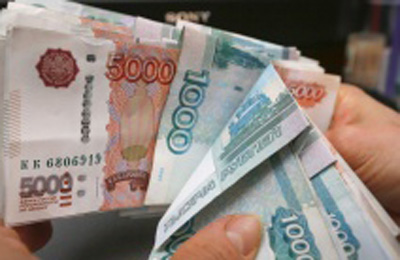
Russia forecasts economic slump as oil falls
MOSCOW, December 27, 2014
Slumping oil prices have put Russia's economy on course for a sharp recession and double-digit inflation next year, government ministers said, as authorities scaled up a bailout for the first bank to succumb to this month's rouble crisis.
The economy is slowing sharply as Western sanctions over the Ukraine crisis deter foreign investment and spur capital flight, and as a slump in oil prices severely reduces Russia's export revenues and pummels the rouble.
The government has taken steps to support key banks and address the deepening currency crisis in the past week, including a sharp and unexpected interest rate hike, but analysts are pessimistic on the outlook for both the economy and the rouble.
Finance Minister Anton Siluanov told journalists on Friday the economy could shrink by 4 percent in 2015, its first contraction since 2009, if oil prices averaged their current level of $60 a barrel.
Siluanov also said the country would run a budget deficit of more than 3 percent next year if the oil price did not rise.
"Next year we will, without doubt, have to bring the Reserve Fund into play," he said, referring to one of Russia's two rainy-day funds intended to support the economy at times of crisis.
Crude prices have almost halved from their June peak amid a global glut and a decision by producer group OPEC not to cut output. Saudi Arabia said on Friday it was prepared to withstand a prolonged period of low prices.
"We need to have our budget break even at $70 per barrel by 2017," said Siluanov.
Russia's government imposed informal capital controls this week, including orders to large state-controlled oil and gas exporters Gazprom and Rosneft to sell some of their dollar revenues to shore up the rouble.
Russians have kept a wary eye on the exchange rate since the collapse of the Soviet Union. Hyper-inflation wiped out their savings over several years in the early 1990s and the rouble collapsed again in 1998.
The rouble's latest fall will inevitably lead to higher inflation next year, which after years of stability threatens President Vladimir Putin's reputation for ensuring Russia's prosperity.
"The inflation forecast is tough, high. We forecast the level of 10 percent at the end of the year (2015)," Russian Economy Minister Alexei Ulyukayev said on Friday.
Inflation would remain in double digits throughout 2015, peaking at the end of the first quarter or in the second quarter, he added.
The Russian currency slipped on Friday after hitting its strongest levels in more than three weeks earlier in the day.
The rouble traded at 53.9 per dollar during the evening, a sharp rebound from its recent all-time lows of 80 but still far weaker than the 30-35 range it was trading at in the first half of 2014.
"If oil goes down to $50 (per barrel)... I don't think our authorities will be able to artificially maintain the (rouble) rate even with higher sales by exporters," said the head of treasury at a major Russian bank, who asked not to be named because he is not authorised to speak to media.
On Friday, Russian authorities also significantly scaled up rescue funds for Trust Bank, saying they would provide up to $2.4 billion in loans to bail out the mid-sized lender, the first bank to fall victim to the crisis.
The falling rouble has prompted panic buying of foreign currency in Russia and a spike in deposit withdrawals, heaping pressure on a vulnerable banking sector whose access to international capital markets has already been restricted by Western sanctions.
Siluanov said on Friday that authorities would provide additional capital to the country's second-largest bank, VTB , and fellow state lender Gazprombank.
VTB could receive 250 billion roubles and Gazprombank 70 billion roubles to help fund investment projects, including those planned by Russian Railways, he said.
It was not clear whether this support would be in addition to the 1 trillion rouble capital boost the banking sector is set to receive as part of legislation recently approved by parliament.
Credit agency Standard & Poor's said this week it could downgrade Russia's rating to junk as soon as January due to a rapid deterioration in "monetary flexibility" in the country.
"Practically this (a downgrade) may mean the increase of capital outflow from Russia, which would be necessary to replace with instruments we have," Ulyukayev said.
Russia may repurchase corporate bond issues, especially denominated in foreign currency, if needed, he added.
Meanwhile Russian gold and forex reserves have fallen to their lowest levels since 2009 as the central bank has spent billions to prop up the currency. Last week, reserves dropped by as much as $15.7 billion to below $400 billion, down from over $510 billion at the start of the year.-Reuters







